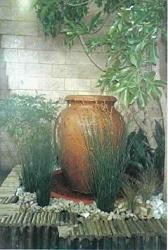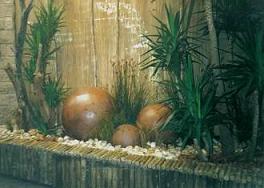Container Gardening, the Modern Lifestyle
Container gardening is becoming more and more popular. Learn how containers brighten up outdoor gardens, patio gardens, gazebos , conservatories, indoors. Container garden design is the easiest way to link your home and garden. You can also follow this modern trend with ease.
Container landscaping suits the modern rushed lifestyle. It is very flexible. Design gardens to express your personality through the containers you choose. Choose the colors of your containers to link your indoor color scheme to your garden.
Care for Container Plants

Many plants may be grown reasonably well in containers. Container plants need more care than plants growing in open ground. Choose suitable plants for containers .
The confined space in a tub restricts root growth. Plants show signs of this. Tub plants have smaller leaves and less flowers, but give them lots of tender loving care and they will be happy and look beautiful.
Raise your containers slightly off the ground. Insert wooden blocks or other material underneath the container. This achieves good drainage and airflow.
Move your containers to a warmer location in severe winter weather. Compost can freeze and your plants die if left exposed in the cold. Bring your plants under cover in icy weather.
Wrap your plants with wet Hessian in very hot conditions. Alternatively use a mist spray to cool your plants off.
Some containers have wheels. This makes them easy to move around. You can also place your containers on a strong piece of wood with wheels underneath.
Choosing Containers

Choose containers that fit in with your garden design . Make a list of requirements before you go to the store to buy a container. This way you will not buy a container at the spur of the moment, and regret it later.
All containers must have suitable drainage holes in their bases. If there is no proper drainage, your plants will drown.
Small containers hold relatively little potting soil. They dry out rapidly. Choose a pot or container one size larger than the existing container. This allows space for growth. All developing shrubs, climbers and in fact all plants need this consideration to be happy.
Choose colors and shapes that will tie in with your home architecture and the plants. Do this right in the beginning of your
container gardening design
. The color and texture of the containers could influence the selection of
suitable plants
.
Planting in Containers
Plant permanent plants, such as trees, shrubs, climbers, and hardy perennials, in early spring. They send out roots during this time and soon become established.
Our gardening tips will teach you how to plant a container. Don’t overlook these essential items when planting a container. I always plant my containers this way.
The growth medium for your container gardening is important. There are different kinds of potting mix.
Soil Less
Soil less medium is based on peat alternatives. It is ideal for short term plantings, e.g. different annuals (pretty flowers)
Soil Based
Sol based medium is used for plants that will remain in the container for a few years, e.g. trees, shrubs and perennials.
Ericaceous
This type of compost is soil less. Camellias like ericaceous compost (they hate lime).
Nourishment of Container Plants
Healthy plants ensure the beauty of container gardening. Your container gardening design must allow for easy access to all containers. This is necessary for the proper nourishment of the plants.
Watering
Stick your finger into the potting soil to check if there is enough moisture. You may also use a special soil moisture tester. Check the moisture daily (or twice daily in hot weather) from mid spring to early autumn. Check plants weekly during winter.
Fill the container to the rim with water when watering. Allow the water to drain through to the bottom. Let it run through a second time. This will ensure that all the potting soil has been thoroughly moistened.
The best time to water is in the early morning.
Feeding
All proprietary composts contain food for a limited period of growth. Begin feeding plants in the period from 4 to 6 weeks after planting in soil less compost. Delay feeding till 8 weeks for plantings in soil based medium.
Only feed your plants during their growing season. This is from mid-spring to end of summer. Use a high nitrogen liquid feed till early summer. Change this to low nitrogen, high potash feeds for the rest of the season.
Choose fertilisers that contain trace elements.
Plant Health
Please take care of your plants. Feed them regularly, turn them every six weeks to give them an even amount of sunshine. Inspect them regularly for
plant health
. I prefer using organic compost and environmentally friendly pest control methods. My plants are healthy, and my garden safe for children to play in.
Gardens Alive
specialises in organic and environmentally friendly garden supplies.
Give your plants lots of TLC (tender loving care).
Containers in the Kitchen Garden
Container Herb Gardening
Container gardening with herbs provides a pleasant addition to your garden design and cooking experience. Learn how to grow herbs successfully in containers.
Container Vegetable Gardening
Vegetable container gardening is very popular for small gardens. Everyone can enjoy home grown vegetables. Vegetables adapt well to growing in containers, provided you follow the guidelines.
Planting Strawberries
Introduce lovely strawberries into your garden by planting strawberries in your containers and herb garden. Growing strawberries successfully is very easy.
Attention: This is limited to the next 7 lucky individuals
“The FREE Shed Plan and Garden Improvement Project ”







